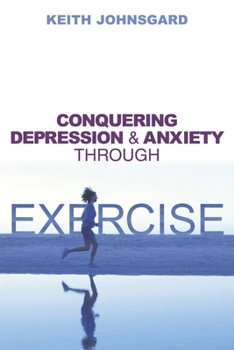Conquering Depression and Anxiety Through Exercise
One out of every two Americans will suffer from some mental disorder during their lifetimes, with depression being the most common problem. How do most of us cope? Usually, we turn to overeating, drinking, and smoking. In short, we treat our unhealthy mental reactions to the American lifestyle with even unhealthier physical habits.Clinical psychologist Keith Johnsgard -- an inveterate runner who is in his 70's -- proposes a better solution in this uplifting book. Why not turn to exercise -- one of the healthiest aspects of American lifestyle -- as a means of improving not just our physical well-being but our state of mind as well? Though usually associated with losing weight and physical fitness, exercise does in fact offer many mental health benefits. Johnsgard inspires us to put on a pair of sneakers and start moving. He draws from a lifetime of clinical experience, research on the psyche of the athlete, and personal experience as an athlete to make a convincing case that exercise can greatly enhance our mental outlook. Further, physical activity decreases the symptoms of depression as well as psychotherapy and drugs, and with only positive side effects Exercise not only reduces depression and anxiety, but also boosts your energy level and self-esteem.If depression and anxiety have overshadowed your life, or you just want to improve your mental outlook while enhancing your physical fitness, this book is a superb motivator to help you help yourself through the healthiest, least expensive, and simplest method available.
Format:Paperback
Language:English
ISBN:1591021928
ISBN13:9781591021926
Release Date:April 2004
Publisher:Prometheus Books
Length:305 Pages
Weight:0.99 lbs.
Dimensions:0.6" x 6.2" x 9.0"
Customer Reviews
3 ratings
Very insightful
Published by Thriftbooks.com User , 17 years ago
This is one of the best books I have read on depression - and I've read a boatload. Keeping in mind that different people respond to information in different ways, choose this book if you like reading facts, statistics, scientific studies and their application to depression (don't let that description lead you to believe the book is dry or dull, just that this is not a wishy-washy book filled with reader testimonies or inspiring images). I especially enjoyed his meta-analysis of multiple studies which he used to illustrate many different aspects of the relationship between depression and exercise, and also his discussion of diet and weightloss in a depression context. Whilst his tone is factual and serious (with everything referenced and clearly backed up), everything is still well explained for the layperson (such as myself). I highly reccommend this book.
Very Helpful Book
Published by Thriftbooks.com User , 20 years ago
The reviewer below, C Fink, wrote a great review of this book, but I have one comment to add: although the author is a runner and some of the studies he cites are based on runners, the author states clearly that any aerobic exercise is fine. I'm not a runner and as I was reading, I didn't think of it as a running book (I prefer bicycling and hiking/walking). I've read quite a few books on depression and anxiety. Although many of them helped me to learn and understand, this book was the most practical/pragmatic. Move your body, breathe hard, you'll feel better. (As the author states, one may also need therapy and medication.) I feel like giving this book to people living with depression and/or anxiety. It could make a huge difference.
Good News from a Runner's World
Published by Thriftbooks.com User , 21 years ago
I came to Johnsgard's book as a recreational runner with none of the psychological disorders he addresses in his book (none diagnosed, anyway). Actually, the title of this delightful book is something of a misnomer; only one of the four sections deals specifically with mental health. In the other three sections, Johnsgard-a psychology professor and a long-time distance runner-takes what I would call an anthropological view of the sport, addressing, as he does, the history of Homo Sapiens and our natural inclination to run. Johnsgard's book is a training manual, a DSM4, and a natural history all in one. What I appreciated most about the book-and there's plenty here for expert runners as well as beginners-was the author's unique perspective. Using both clinical data and anthropological evidence, Johnsgard shows us how far we've come from Shangri-La, and how running can help us return. The author is a fellow homo-naturalis, so if you're homo-progressus, you're not going to find your techno-manna here. Johnsgard debunks the protein diet fads and gives evidence that elements of the hunter-gatherer existence are necessary for physical and mental well-being. Johnsgard is foremost a good storyteller, and beginning with book's prologue, he incorporates elements of case study to illuminate his topics. The result is a thoroughly interesting read about the science and history of running. And while the author is always knowledgeable about his subjects-from existential drift to cardiorespiratory fitness-he's humble too; one gets the sense that he's learned all this news the hard way, and at some personal expense. Johnsgard comes across as the kind of runner you'd like to meet on the trail. Chances are you'll see yourself often in these pages, and that you'll come away with at least a few ideas for self-improvement through exercise.





